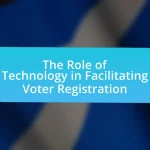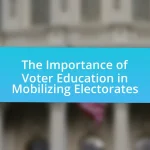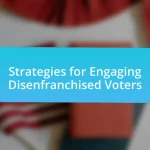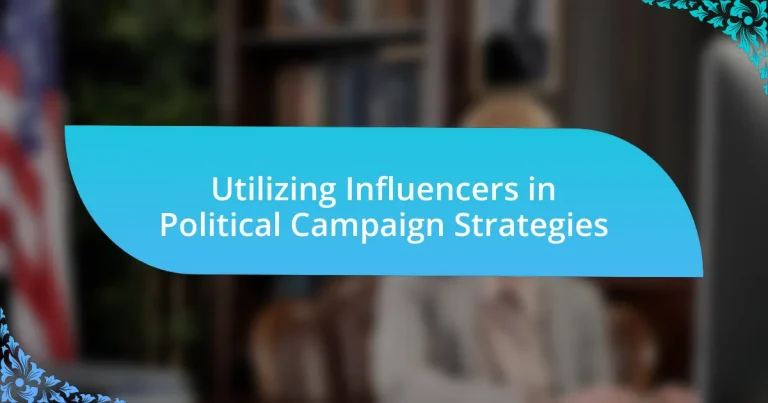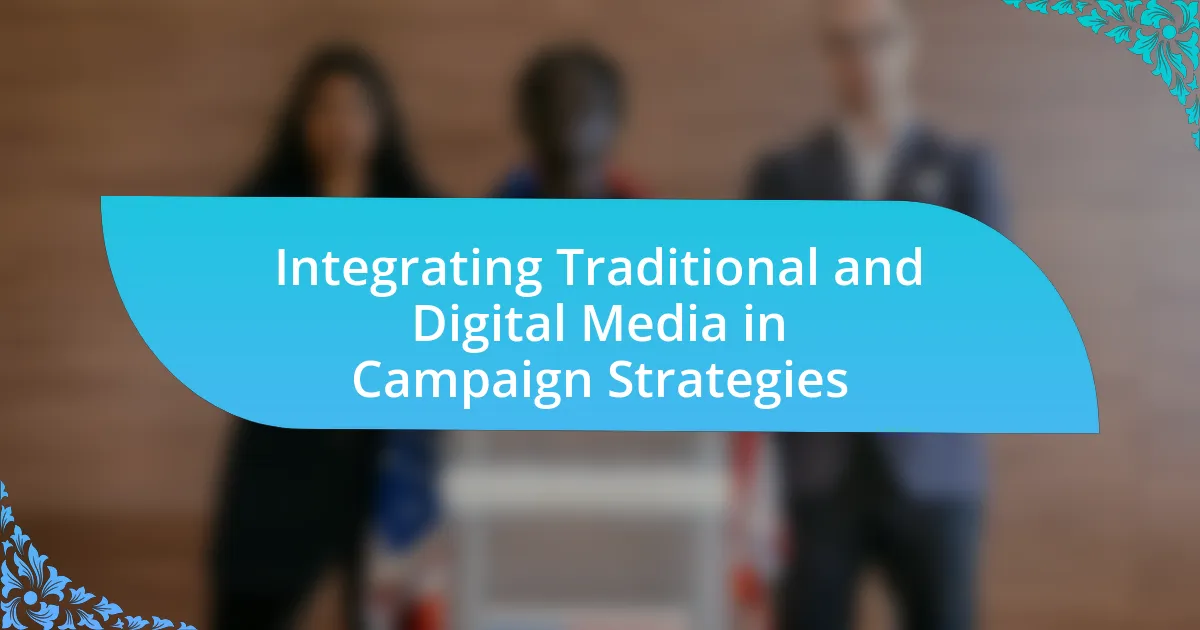Utilizing influencers in political campaign strategies involves leveraging individuals with substantial social media followings to promote political messages and candidates, particularly to engage younger voters. This approach has proven effective, as campaigns employing influencer marketing can see a significant increase in voter turnout. The article explores the impact of influencers on public opinion, the effectiveness of micro-influencers, and the importance of social media platforms in enhancing voter engagement. It also addresses strategies for identifying suitable influencers, maintaining authentic relationships, and navigating challenges such as authenticity concerns and regulatory compliance. Additionally, the article outlines best practices for measuring the effectiveness of influencer partnerships in political contexts.
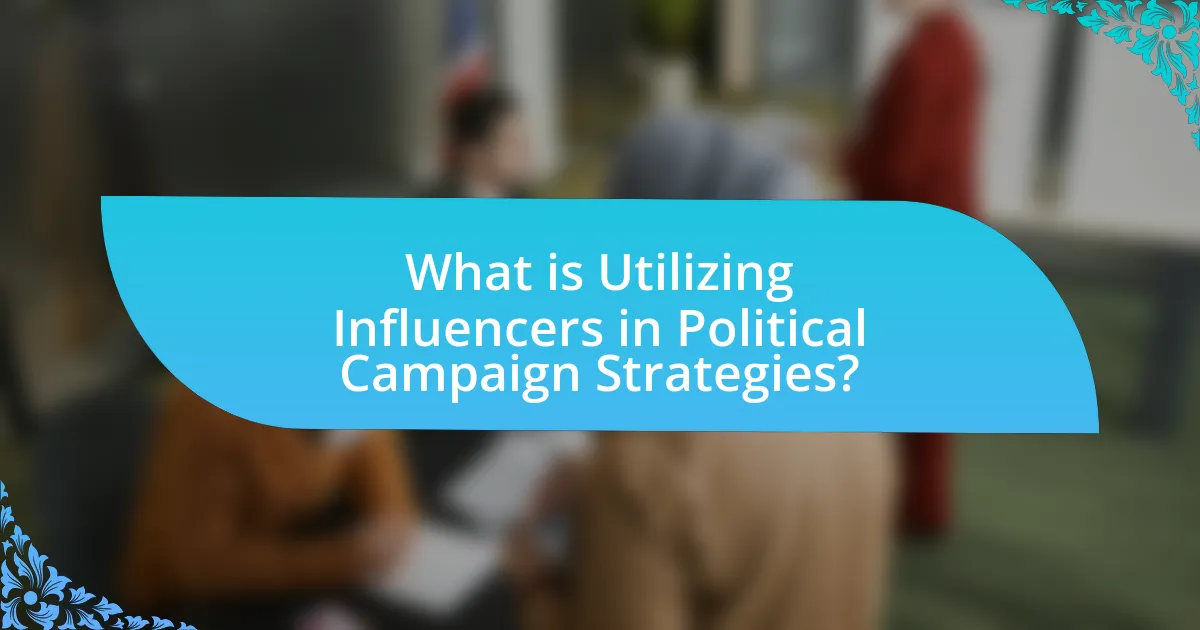
What is Utilizing Influencers in Political Campaign Strategies?
Utilizing influencers in political campaign strategies involves leveraging individuals with significant social media followings to promote political messages and candidates. This approach capitalizes on the influencers’ ability to reach and engage specific demographics, thereby enhancing voter outreach and mobilization. For instance, during the 2020 U.S. presidential election, candidates like Joe Biden and Donald Trump utilized influencers to connect with younger voters, resulting in increased engagement on platforms like Instagram and TikTok. Research indicates that campaigns employing influencer marketing can see a 10-20% increase in voter turnout among targeted groups, demonstrating the effectiveness of this strategy in modern political landscapes.
How do influencers impact political campaigns?
Influencers significantly impact political campaigns by shaping public opinion and mobilizing voter engagement. Their ability to reach large, targeted audiences through social media platforms allows them to disseminate campaign messages effectively. For instance, a study by the Pew Research Center found that 70% of young voters are influenced by social media in their political decisions, highlighting the importance of influencers in reaching this demographic. Additionally, influencers can humanize candidates and create relatable narratives, which can enhance voter connection and trust. This strategic use of influencers has been shown to increase voter turnout and engagement, as evidenced by the 2020 U.S. presidential election, where campaigns leveraging influencers saw higher participation rates among younger voters.
What types of influencers are most effective in political contexts?
Micro-influencers are the most effective types of influencers in political contexts. They typically have a smaller but highly engaged audience, which allows for more authentic connections and trust. Research indicates that micro-influencers can achieve engagement rates of up to 7% compared to the 1-3% average of larger influencers. This heightened engagement is crucial in political campaigns, where voter trust and relatability significantly impact decision-making. Additionally, micro-influencers often focus on niche topics, enabling them to reach specific demographics that align with particular political messages or causes, thereby enhancing the effectiveness of targeted political strategies.
How do influencers shape public opinion during elections?
Influencers shape public opinion during elections by leveraging their social media platforms to disseminate information, engage followers, and promote specific candidates or policies. Their ability to reach large, targeted audiences allows them to sway perceptions and mobilize voter engagement effectively. For instance, a study by the Pew Research Center found that 70% of young voters are influenced by social media in their political decisions, highlighting the significant impact influencers have on shaping electoral outcomes.
Why are influencers becoming essential in modern political strategies?
Influencers are becoming essential in modern political strategies because they possess the ability to reach and engage specific demographics effectively. Their established trust and rapport with followers allow political messages to resonate more authentically, leading to increased voter engagement. For instance, a study by the Pew Research Center found that 72% of teenagers trust influencers more than traditional celebrities, highlighting their impact on younger voters. Additionally, influencers can create tailored content that aligns with their audience’s values, making political campaigns more relatable and effective. This strategic use of influencers enables campaigns to leverage social media platforms, where a significant portion of the electorate spends their time, thus enhancing outreach and mobilization efforts.
What role do social media platforms play in influencer effectiveness?
Social media platforms are crucial in enhancing influencer effectiveness by providing a direct channel for engagement and audience reach. These platforms facilitate the dissemination of content, allowing influencers to connect with their followers in real-time, which increases the likelihood of message retention and action. For instance, a study by the Pew Research Center found that 72% of adults use at least one social media site, highlighting the vast audience influencers can access. Additionally, algorithms on platforms like Instagram and TikTok prioritize engaging content, which can amplify an influencer’s visibility and impact. This dynamic interaction fosters trust and authenticity, essential elements in political campaign strategies, as influencers can sway public opinion and mobilize support effectively.
How do influencers enhance voter engagement and turnout?
Influencers enhance voter engagement and turnout by leveraging their large followings to disseminate information and mobilize their audiences. They create relatable content that resonates with younger demographics, often using platforms like Instagram and TikTok, where traditional political messaging may not reach effectively. For instance, a study by the Pew Research Center found that 71% of young adults aged 18-29 use social media as a primary source for political news, indicating the significant role influencers play in shaping political discourse. Additionally, influencers often encourage their followers to participate in voting through calls to action, sharing registration information, and highlighting the importance of civic engagement, which can lead to increased voter turnout.
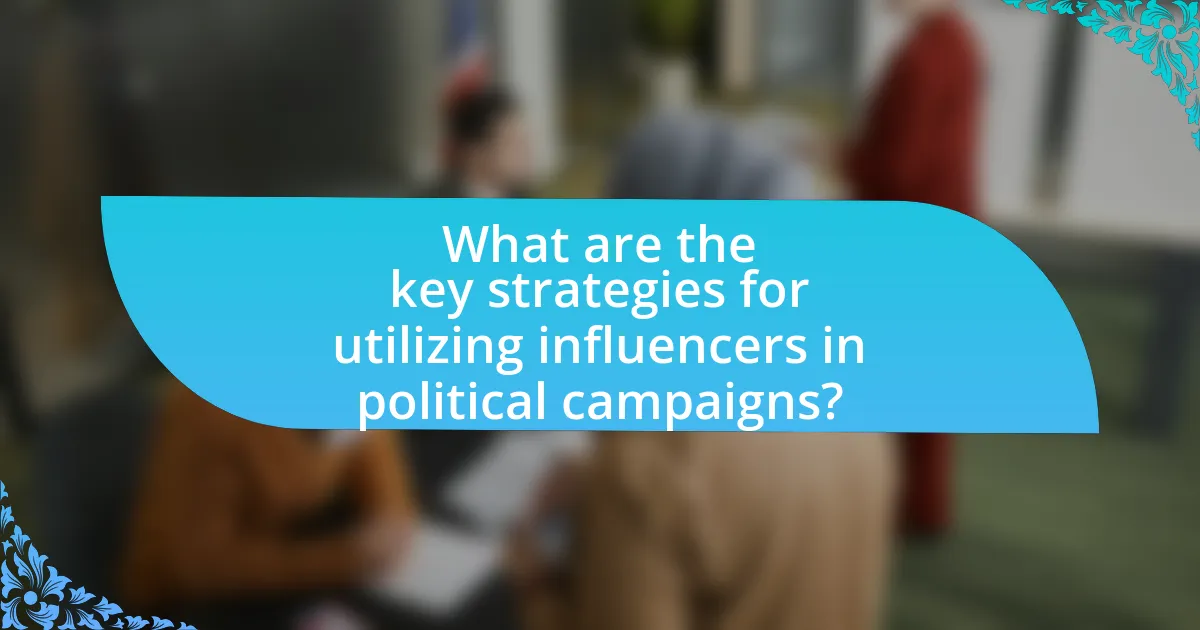
What are the key strategies for utilizing influencers in political campaigns?
Key strategies for utilizing influencers in political campaigns include identifying relevant influencers, leveraging their platforms for targeted messaging, and fostering authentic relationships. Identifying influencers who align with the campaign’s values and target demographics ensures that the message resonates with the intended audience. For instance, a study by the Pew Research Center indicates that 70% of young voters are influenced by social media personalities, highlighting the importance of selecting the right influencers. Leveraging influencers’ platforms allows campaigns to reach wider audiences through tailored content that engages followers effectively. Additionally, fostering authentic relationships with influencers can enhance credibility, as audiences are more likely to trust endorsements from individuals they feel a personal connection with. This strategy is supported by data from the Digital Marketing Institute, which shows that 92% of consumers trust recommendations from individuals over brands.
How can campaigns identify the right influencers to partner with?
Campaigns can identify the right influencers to partner with by analyzing their audience demographics, engagement rates, and alignment with campaign values. This process involves using tools like social media analytics platforms to assess the influencer’s reach and the authenticity of their interactions with followers. For instance, a study by the Influencer Marketing Hub found that influencers with a high engagement rate (above 3%) are more effective in driving audience action, making them preferable partners for campaigns. Additionally, campaigns should evaluate the influencer’s previous collaborations and content to ensure compatibility with their messaging and goals.
What criteria should be used to evaluate potential influencers?
To evaluate potential influencers, key criteria include audience engagement, relevance to the political campaign, authenticity, and reach. Audience engagement measures how actively followers interact with the influencer’s content, indicating their influence and ability to mobilize support. Relevance ensures that the influencer’s values and messaging align with the campaign’s objectives, which is crucial for effective communication. Authenticity refers to the influencer’s credibility and trustworthiness, as audiences are more likely to respond positively to genuine voices. Reach assesses the size of the influencer’s audience, which impacts the potential visibility of the campaign. These criteria are supported by studies showing that campaigns leveraging authentic and relevant influencers achieve higher engagement rates and voter mobilization.
How can campaigns assess an influencer’s audience alignment?
Campaigns can assess an influencer’s audience alignment by analyzing demographic data, engagement metrics, and audience interests. Demographic data includes age, gender, location, and interests of the influencer’s followers, which can be obtained through analytics tools like Instagram Insights or Twitter Analytics. Engagement metrics, such as likes, shares, and comments, indicate how well the influencer’s audience interacts with content, reflecting their alignment with the campaign’s message. Additionally, audience interests can be evaluated through surveys or social listening tools to ensure that the influencer’s followers resonate with the campaign’s goals. This multi-faceted approach provides a comprehensive understanding of whether the influencer’s audience aligns with the campaign’s target demographic and messaging.
What methods can be employed to effectively collaborate with influencers?
To effectively collaborate with influencers, political campaigns should employ methods such as establishing clear communication, aligning values, and creating mutually beneficial partnerships. Clear communication ensures that both parties understand expectations and goals, which is crucial for a successful collaboration. Aligning values between the campaign and the influencer fosters authenticity, making the partnership more credible to the audience. Additionally, creating mutually beneficial partnerships, such as offering compensation or exclusive content, incentivizes influencers to actively promote the campaign. Research indicates that campaigns that prioritize these methods see higher engagement rates and improved public perception, demonstrating the effectiveness of strategic influencer collaborations in political contexts.
How can campaigns create compelling content for influencer promotion?
Campaigns can create compelling content for influencer promotion by aligning the messaging with the influencer’s authentic voice and audience interests. This approach ensures that the content resonates with the influencer’s followers, increasing engagement and effectiveness. For instance, a study by the Digital Marketing Institute found that 49% of consumers depend on influencer recommendations, highlighting the importance of authenticity in content creation. By leveraging storytelling techniques and incorporating visuals that reflect the campaign’s values, campaigns can enhance relatability and emotional connection, further driving audience engagement.
What are the best practices for maintaining influencer relationships?
The best practices for maintaining influencer relationships include consistent communication, mutual respect, and providing value to the influencer. Consistent communication ensures that both parties are aligned on goals and expectations, fostering a collaborative environment. Mutual respect involves recognizing the influencer’s expertise and audience, which builds trust and loyalty. Providing value, such as exclusive content or insights, enhances the relationship and encourages ongoing collaboration. Research indicates that 70% of marketers believe that influencer relationships are crucial for brand success, highlighting the importance of these practices in effective political campaign strategies.
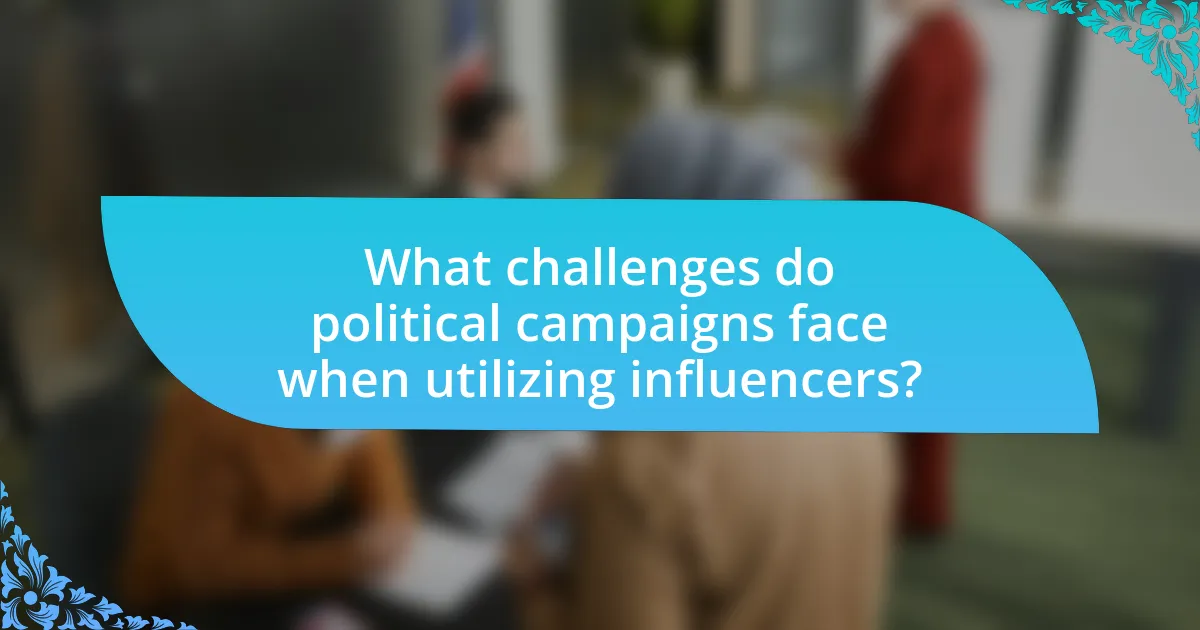
What challenges do political campaigns face when utilizing influencers?
Political campaigns face several challenges when utilizing influencers, including authenticity concerns, audience alignment, and regulatory compliance. Authenticity issues arise when influencers may not genuinely support the campaign, leading to skepticism among their followers. Audience alignment is critical; if the influencer’s demographic does not match the campaign’s target voters, the message may not resonate effectively. Additionally, regulatory compliance poses a challenge, as campaigns must navigate disclosure requirements and advertising regulations set by entities like the Federal Election Commission. These factors can complicate the strategic use of influencers in political messaging.
How can campaigns navigate potential backlash from influencer partnerships?
Campaigns can navigate potential backlash from influencer partnerships by conducting thorough vetting of influencers to ensure alignment with campaign values and audience expectations. This proactive approach minimizes the risk of misalignment that could lead to public criticism. For instance, campaigns should analyze an influencer’s past content, audience demographics, and engagement metrics to assess compatibility. Additionally, establishing clear communication and guidelines with influencers regarding messaging can help mitigate misunderstandings. Research indicates that 70% of consumers are more likely to trust a brand when they see authentic influencer partnerships, highlighting the importance of genuine alignment. By prioritizing these strategies, campaigns can effectively manage and reduce the likelihood of backlash.
What strategies can mitigate risks associated with influencer controversies?
To mitigate risks associated with influencer controversies, political campaigns should implement thorough vetting processes for influencers, establish clear communication guidelines, and prepare crisis management plans. Vetting influencers involves assessing their past behavior, public statements, and affiliations to ensure alignment with campaign values. Clear communication guidelines help influencers understand the campaign’s messaging and expectations, reducing the likelihood of misinterpretation or misrepresentation. Additionally, having a crisis management plan in place allows campaigns to respond swiftly and effectively to any controversies that arise, minimizing potential damage to the campaign’s reputation. These strategies are supported by case studies showing that proactive measures can significantly reduce the impact of influencer-related controversies on political campaigns.
How can campaigns address authenticity concerns in influencer marketing?
Campaigns can address authenticity concerns in influencer marketing by selecting influencers whose values align closely with the campaign’s message and target audience. This alignment fosters genuine connections, as studies show that 70% of consumers prefer to engage with brands that reflect their personal values. Additionally, campaigns should encourage influencers to share personal stories and experiences related to the campaign, enhancing relatability and trust. Transparency about partnerships, such as disclosing sponsored content, further reinforces authenticity; research indicates that 61% of consumers are more likely to trust influencers who are open about their collaborations. By prioritizing these strategies, campaigns can effectively mitigate authenticity concerns and build stronger relationships with their audience.
What legal and ethical considerations must be taken into account?
Legal and ethical considerations in utilizing influencers in political campaign strategies include compliance with campaign finance laws, transparency in sponsorship disclosures, and adherence to truthfulness in messaging. Campaign finance laws, such as the Federal Election Commission regulations in the United States, require that any financial contributions or expenditures related to political campaigns be reported, ensuring that influencers do not exceed contribution limits or fail to disclose their financial relationships with candidates. Transparency mandates that influencers clearly disclose their sponsorships to maintain trust with their audience, as outlined by the Federal Trade Commission guidelines. Additionally, ethical considerations involve ensuring that the messaging conveyed by influencers is truthful and not misleading, as false information can undermine democratic processes and violate advertising standards. These considerations are crucial for maintaining integrity in political campaigning and fostering public trust.
What regulations govern influencer marketing in political campaigns?
Influencer marketing in political campaigns is primarily governed by the Federal Election Commission (FEC) regulations, which require transparency in political advertising. The FEC mandates that any paid political communication, including influencer endorsements, must disclose the source of funding and identify the sponsor. Additionally, influencers must adhere to the Federal Trade Commission (FTC) guidelines, which stipulate that endorsements must be clearly disclosed as paid partnerships or sponsorships to avoid misleading the audience. These regulations ensure that voters are aware of the financial backing behind political messages, promoting accountability and transparency in the electoral process.
How can campaigns ensure transparency in influencer collaborations?
Campaigns can ensure transparency in influencer collaborations by clearly disclosing the nature of the partnership to the audience. This includes using appropriate hashtags such as #ad or #sponsored to indicate paid promotions, which aligns with Federal Trade Commission (FTC) guidelines that mandate transparency in advertising. Additionally, campaigns should provide detailed information about the influencer’s role, the content being shared, and the objectives of the collaboration. By adhering to these practices, campaigns foster trust and credibility with their audience, as evidenced by studies showing that transparency in influencer marketing can enhance consumer trust and engagement.
What are the best practices for leveraging influencers in political campaigns?
The best practices for leveraging influencers in political campaigns include identifying relevant influencers, establishing authentic relationships, and creating engaging content. Identifying influencers who align with the campaign’s values and target audience ensures that the message resonates effectively. Establishing authentic relationships with these influencers fosters trust, which is crucial for their followers to engage with the campaign. Creating engaging content that encourages influencers to share their genuine opinions can amplify the campaign’s reach and impact. For instance, a study by the Pew Research Center found that 70% of social media users trust influencers’ recommendations, highlighting the effectiveness of this strategy in political contexts.
How can campaigns measure the effectiveness of influencer partnerships?
Campaigns can measure the effectiveness of influencer partnerships through metrics such as engagement rates, reach, conversion rates, and sentiment analysis. Engagement rates, which include likes, shares, and comments, indicate how well the audience interacts with the content promoted by the influencer. Reach measures the total number of unique users who see the content, providing insight into the potential audience size. Conversion rates track the number of users who take a desired action, such as signing up for a newsletter or making a donation, directly linked to the influencer’s promotion. Sentiment analysis assesses the public’s perception of the campaign based on comments and discussions generated by the influencer’s content. These metrics collectively provide a comprehensive view of the partnership’s impact on campaign goals.
What tips can enhance the success of influencer-driven political strategies?
To enhance the success of influencer-driven political strategies, campaigns should prioritize authentic partnerships with influencers who align with their values and target audience. Authenticity fosters trust, which is crucial in political messaging; studies show that 92% of consumers trust recommendations from individuals over brands. Additionally, campaigns should leverage data analytics to identify influencers with high engagement rates among their desired demographics, ensuring that messages reach the most receptive audiences. Engaging influencers in co-creating content can also amplify the message, as collaborative efforts often resonate more with followers. Finally, establishing clear goals and metrics for measuring the impact of influencer collaborations will help campaigns assess effectiveness and make necessary adjustments.



